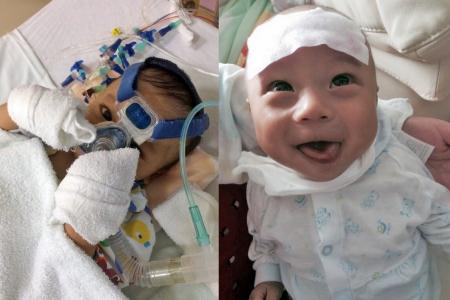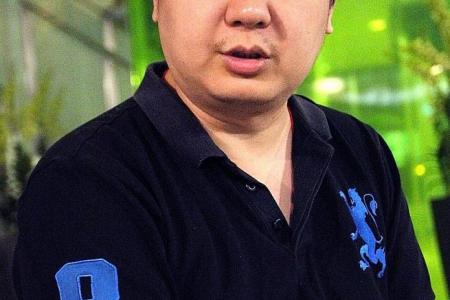Family faces dilemma as baby's liver fails again after transplant
Baby's liver deterioriates soon after organ transplant
His son's recovery is hanging by a thread due to a liver transplant complication and he is in no state for a retransplantation.
Yet Mr Lawrence Xia, 31, is still praying fervently for a potential liver donor among a handful who are being tested.
"This is the only thing we can do now. For us, as parents, we don't want to regret. If there is a chance of a retransplant, at least we are ready," said the investment executive.
Doctors found eight-month-old Kingsley's liver function failing in September.
The baby went through a transplant earlier this month with part of a liver donated by Mr Xia's wife, Madam Zhang Ying.
Just when the couple thought their worst nightmare was over, Kingsley's liver function started failing again.
"It's been a period of emotional turbulence. I can't even count how many ups and downs we've been through.
"I believe the number of times I cried in the past month is more than what I've cried in my past 30 years, including the time when I was still a baby," Mr Xia said quietly, as he related the sequence of events to The New Paper on Thursday.
SURPRISE
Kingsley's condition surprised the couple. There was nothing to suggest that something was wrong with the baby, who was born in March, except that he had jaundice.
Jaundice may be an indicator of childhood liver failure, but it is definitely not representative of the condition, said a gastroenterologist, Dr Mark Fernandes. (See report above.)
"We were very, very happy," said first-time parent Mr Xia about the new baby.
But when the baby's jaundice persisted after two months, doctors suggested he be hospitalised.
That marked the start of a never-ending emotional roller coaster for Mr Xia and his wife, who are both permanent residents.
The couple's first scare came in the form of a suspicion: Doctors said Kingsley could have biliary atresia, a rare condition in which one or more bile ducts are narrowed, blocked or completely absent.
After some tests and investigations, this turned out to be a false alarm, to the couple's relief.
They took Kingsley home and sank into blissful parenthood.
But bad news came knocking again in September, when Kingsley's liver function suddenly showed signs of failure.
Pausing to heave a huge sigh, Mr Xia said: "That's the beginning of the whole episode for us.
"Since birth, his jaundice was always there and for the first time (after a few months), we saw a jaundice-free baby. He was doing okay.
"But something just happened and he deteriorated. It was quite devastating to us because it was all very sudden. We were hoping he would recover soon, but he suddenly deteriorated a lot faster."
Doctors assessed the need for a liver transplant and his wife was the only compatible donor in the family.
He said: "Back then, we didn't tell our friends about our son because it was a private family matter. We didn't want our son to grow up with everyone knowing that he was a sickly baby and needed a transplant."
After a 14-hour transplant procedure,the couple thought their worst nightmare was over.
There were signs of deteriorating liver function linked to a bacterial infection, but his condition was "heading in the right direction" after two weeks, Mr Xia said.
But two weeks ago, Kingsley's liver function declined again.
Not knowing what led to Kingsley's condition is the couple's biggest grief, but they are now focused on their son's recovery.
"A few days ago, the doctors were implying that we should be mentally prepared for anything that happens.
"Now, I'm not too certain. There's an infection that is going on in him and he's in a pretty critical condition, but his deterioration is slowing down. It could be because the doctors are also using new antibiotics, but we don't know yet."
Doctors are supporting his liver function as much as possible and have ruled out liver retransplantation at the moment, he said.
HIGH RISK
Mr Xia decided to put his baby's story online, hoping to find a suitable donor, should doctors find that Kingsley is suitable for the high-risk procedure.
"We have received many calls and messages and inquiries (on) how they can help.
"More than 30 people said they want to be considered as potential donors, but at the same time, we don't want to overwhelm the hospital with so many contacts...
"We hope that the first batch (of potential donors) will provide some hope," he said.
Strangers and close friends have also offered donations in kind, something Mr Xia and his wife, a legal counsel, are touched by but have not accepted so far.
"We are already asking for a lot of help from the people and society and we feel that it's not right to ask for more help at this stage," said Mr Xia.
After having their hopes dashed one too many times, Mr Xia and his wife are trying to keep their expectations in check.
"It's a balancing act. We try not to be too hopeful, but also not too cynical about the outcome. Statistically, nothing is impossible. He can recover the next day and the worst scenario is also possible.
"But we don't want to think about that possibility," he said.
"I believe the number of times I cried in the past month is more than what I've cried in my past 30 years, including the time when I was still a baby."
- Mr Lawrence Xia on dealing with his son Kingsley's liver condition
About childhood liver failure
A number of factors can cause childhood liver failure and most are present from birth.
Biliary atresia is the most common one, where one or more bile ducts are narrowed, blocked or completely absent, said Dr Mark Fernandes.
Even then, it strikes only one in 15,000 live births in the US, said the gastroenterologist at Gutcare Digestive.Liver.Endoscopy Associates.
Liver failure in babies can also be due to inborn genetic errors of metabolism.
Children with progressive liver failure or cirrhosis would benefit from a liver transplant. If the transplanted liver function declines, the only option is to go for a retransplantation.
However, retransplant surgery is technically difficult and is a high-risk procedure, said Dr Fernandes, a former transplant hepatologist.
The surgery is discouraged if the baby has an ongoing infection.
It will also not be performed if the baby's organs (apart from the liver) are also failing, and the baby is unlikely to survive the operation.
Another consideration is the limited availability of organs from donors, said Dr Fernandes.
Kingsley's case highlights the need for Singaporeans to recognise the importance of organ donation in Singapore, he said.
Get The New Paper on your phone with the free TNP app. Download from the Apple App Store or Google Play Store now




